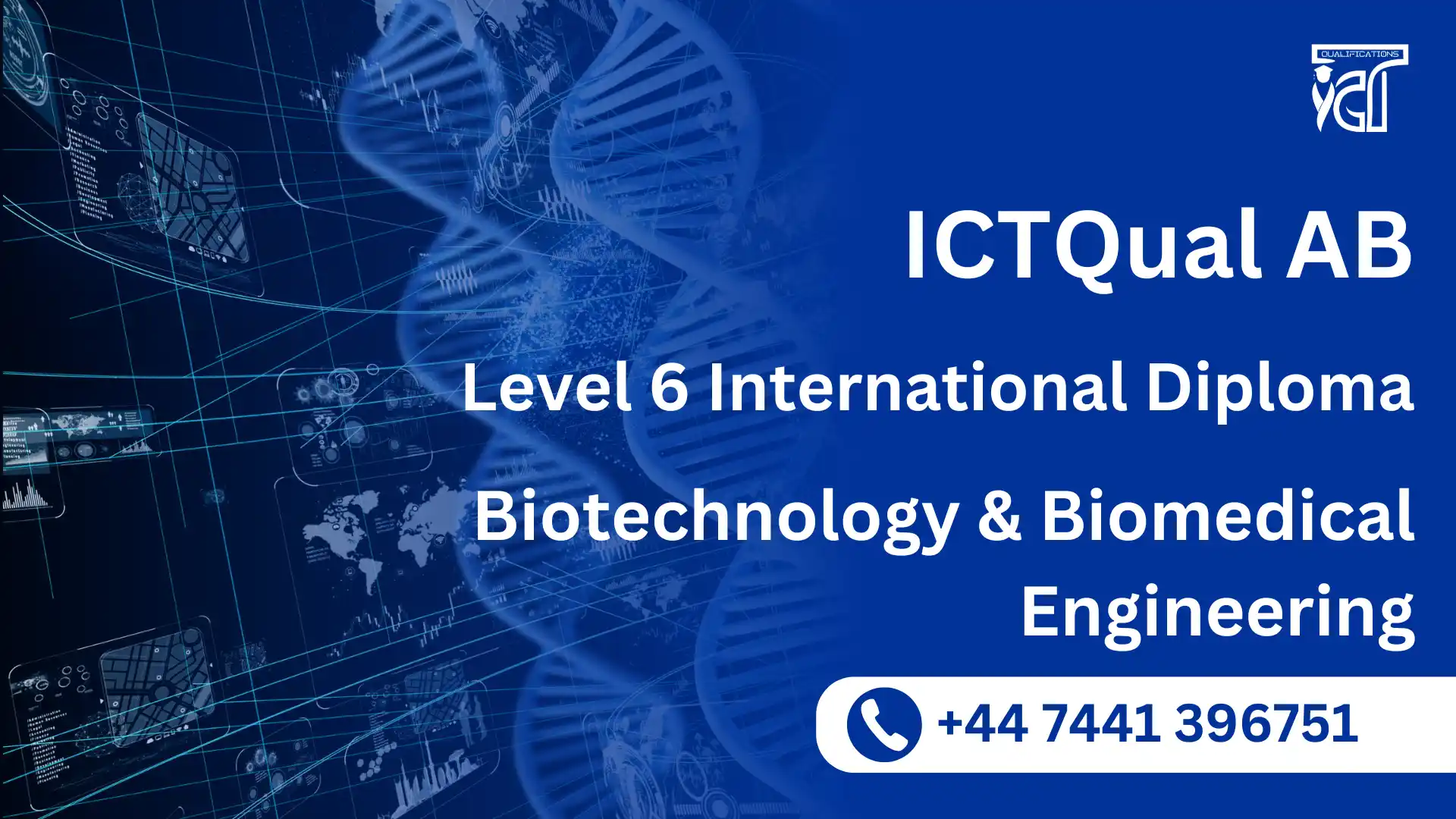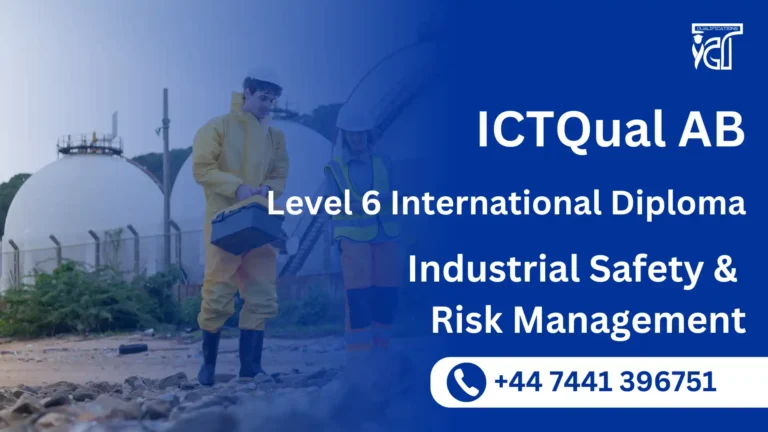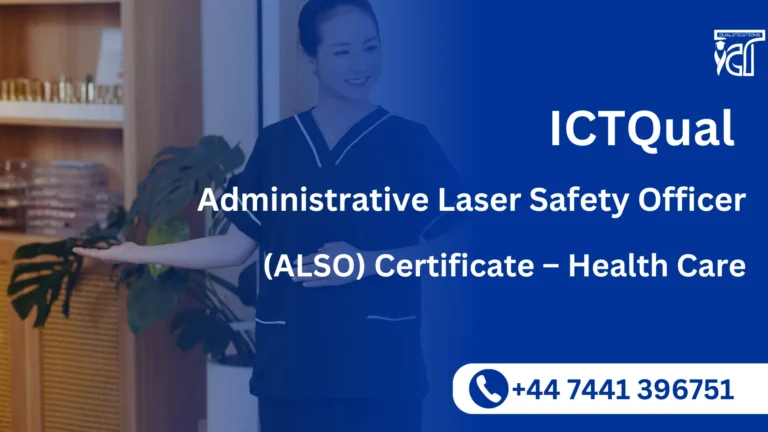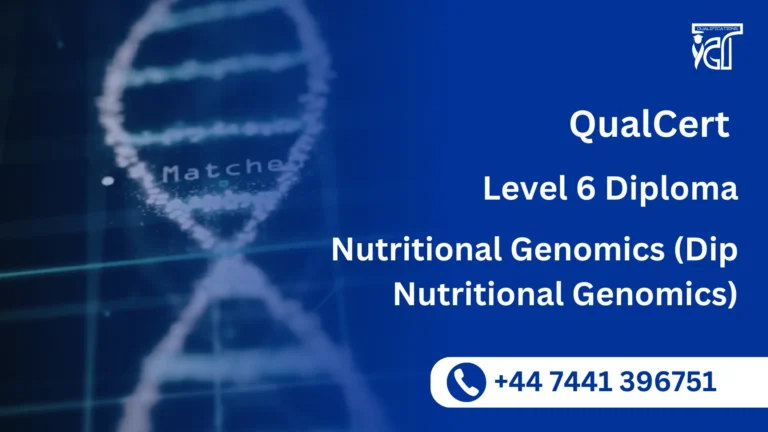The ICTQual AB Level 6 International Diploma in Biotechnology and Biomedical Engineering is a comprehensive three-year programme, structured around 360 credits, designed to equip learners with advanced knowledge and practical expertise in biotechnology, biomedical systems, and engineering applications in healthcare. The ICTQual AB Level 6 International Diploma in Biotechnology and Biomedical Engineering provides learners with the technical and analytical skills required to excel in research, development, and applied biomedical technology roles.
Ideal for fresh learners entering the biotechnology or biomedical sector and experienced professionals seeking career advancement, the ICTQual AB Level 6 International Diploma in Biotechnology and Biomedical Engineering blends foundational scientific principles with cutting-edge engineering techniques. Learners gain hands-on experience in molecular biology, bioinformatics, medical device design, and bioprocess engineering, preparing them to contribute effectively to laboratory, clinical, and industrial settings.
Upon completion the ICTQual AB Level 6 International Diploma in Biotechnology and Biomedical Engineering, learners can apply their skills to develop innovative biomedical solutions, optimise biotechnological processes, and support healthcare research and diagnostics. Career opportunities include roles such as biomedical engineer, biotechnology researcher, laboratory technologist, clinical research analyst, and positions in healthcare technology companies, pharmaceutical firms, and research institutions.
Key benefits of this ICTQual AB Level 6 International Diploma in Biotechnology and Biomedical Engineering include enhanced professional credibility, practical skill development, and preparation for leadership and specialist roles in biotechnology and biomedical engineering. Learners also develop critical thinking, problem-solving, and research skills, ensuring they remain competitive in a rapidly evolving global healthcare and technology landscape.
Whether starting a professional journey or advancing an existing career, this ICTQual AB Level 6 International Diploma in Biotechnology and Biomedical Engineering provides learners with a robust foundation for success, fostering expertise, confidence, and long-term professional impact.
ICTQual AB Level 6 International Diploma in Biotechnology and Biomedical Engineering
This qualification, the ICTQual AB Level 6 International Diploma in Biotechnology and Biomedical Engineering 360 Credits – Three Years, consists of 36 mandatory units.
Year 1: Foundation in Biotechnology & Biomedical Engineering
- Introduction to Biotechnology and Biomedical Engineering
- Fundamentals of Human Anatomy and Physiology
- Principles of Molecular Biology and Genetics
- Biochemistry for Life Sciences
- Microbiology and Infection Control
- Laboratory Safety and Quality Assurance
- Principles of Pharmacology and Therapeutics
- Mathematics and Statistics for Biomedical Applications
- Computer Applications in Biotechnology
- Communication Skills for Science and Healthcare Professionals
- Introduction to Research and Evidence-Based Practice
- Ethics and Professional Conduct in Biomedical Sciences
Year 2: Intermediate Biotechnology & Biomedical Engineering Applications
- Genetic Engineering and Recombinant DNA Technology
- Cell Biology and Tissue Engineering
- Clinical Biochemistry and Diagnostic Techniques
- Immunology and Serology
- Instrumentation and Analytical Methods in Biotechnology
- Microbial Biotechnology and Industrial Applications
- Molecular Diagnostics and Laboratory Techniques
- Bioprocess Engineering and Biomanufacturing
- Data Analysis and Biomedical Informatics
- Health and Safety in Biomedical Laboratories
- Leadership and Teamwork in Scientific Practice
- Applied Research Methods and Experimental Design
Year 3: Advanced Specialisation and Professional Application
- Advanced Molecular Biology and Genomics
- Advanced Immunology and Clinical Applications
- Biomedical Device Engineering and Design
- Advanced Bioprocessing and Biopharmaceutical Production
- Stem Cell Technology and Regenerative Medicine
- Bioinformatics and Computational Biology
- Clinical Trial Design and Regulatory Compliance
- Advanced Laboratory Techniques and Automation
- Quality Management and Risk Assessment in Biomedicine
- Emerging Technologies in Biotechnology and Healthcare
- Research Project / Dissertation
- Professional Practice and Practical Competency Assessment
Learning Outcomes for the Level 6 International Diploma in Biotechnology and Biomedical Engineering 360 Credits – Three Years:
Year 1: Foundational Knowledge
By the end of Year 1, learners will be able to:
Introduction to Biotechnology and Biomedical Engineering
- Explain the fundamental concepts and scope of biotechnology and biomedical engineering.
- Identify key applications of biotechnology in healthcare and industry.
- Demonstrate understanding of interdisciplinary approaches in biomedical sciences.
Fundamentals of Human Anatomy and Physiology
- Describe the structure and function of major human body systems.
- Apply anatomical and physiological knowledge to biomedical contexts.
- Recognise normal versus abnormal physiological conditions relevant to laboratory practice.
Principles of Molecular Biology and Genetics
- Explain DNA, RNA, and protein synthesis processes.
- Understand basic genetic principles and inheritance patterns.
- Apply molecular biology concepts to laboratory experiments and biotechnology applications.
Biochemistry for Life Sciences
- Describe the structure and function of biomolecules.
- Explain metabolic pathways and their significance in cellular processes.
- Apply biochemical knowledge to problem-solving in biomedical contexts.
Microbiology and Infection Control
- Identify common microorganisms and their clinical significance.
- Apply infection prevention and control measures in laboratory settings.
- Evaluate microbiological data for safe and effective laboratory practice.
Laboratory Safety and Quality Assurance
- Demonstrate safe handling of laboratory equipment and biological materials.
- Apply quality control procedures in experimental and clinical work.
- Recognise and mitigate potential hazards in biotechnology laboratories.
Principles of Pharmacology and Therapeutics
- Explain drug mechanisms, pharmacokinetics, and pharmacodynamics.
- Apply safe handling and administration principles in laboratory simulations.
- Evaluate therapeutic interventions based on evidence and clinical relevance.
Mathematics and Statistics for Biomedical Applications
- Apply statistical methods to analyse biomedical data.
- Use mathematical tools to model biological systems.
- Interpret experimental results using appropriate quantitative techniques.
Computer Applications in Biotechnology
- Use digital tools for data collection, analysis, and reporting.
- Apply bioinformatics software for sequence analysis and molecular modeling.
- Demonstrate competence in managing laboratory information systems.
Communication Skills for Science and Healthcare Professionals
- Communicate scientific information clearly to diverse audiences.
- Prepare accurate laboratory reports and presentations.
- Apply professional communication techniques in collaborative environments.
Introduction to Research and Evidence-Based Practice
- Explain principles of scientific research and experimental design.
- Critically evaluate research literature for validity and relevance.
- Apply evidence-based approaches to support laboratory decision-making.
Ethics and Professional Conduct in Biomedical Sciences
- Apply ethical principles in research and laboratory practice.
- Recognise professional responsibilities in healthcare and biotechnology.
- Maintain integrity, confidentiality, and accountability in all professional activities.
Year 2: Intermediate Proficiency
By the end of Year 2, learners will be able to:
Genetic Engineering and Recombinant DNA Technology
- Demonstrate knowledge of gene manipulation techniques.
- Apply recombinant DNA methods to laboratory experiments.
- Evaluate ethical considerations in genetic engineering applications.
Cell Biology and Tissue Engineering
- Understand cell structure, function, and signalling pathways.
- Apply tissue engineering principles to experimental designs.
- Analyse cellular responses in biomedical applications.
Clinical Biochemistry and Diagnostic Techniques
- Conduct and interpret biochemical assays.
- Apply diagnostic techniques to assess patient or experimental samples.
- Evaluate clinical relevance of biochemical findings.
Immunology and Serology
- Describe the immune system and its response mechanisms.
- Perform basic serological tests and interpret results.
- Apply immunological knowledge to disease detection and prevention.
Instrumentation and Analytical Methods in Biotechnology
- Operate laboratory instruments such as spectrophotometers and chromatographs.
- Apply analytical techniques for biomolecular analysis.
- Evaluate accuracy and reliability of experimental data.
Microbial Biotechnology and Industrial Applications
- Apply microbial techniques for industrial and laboratory purposes.
- Evaluate microbial growth and product yield in bioprocesses.
- Integrate microbiology knowledge into biotechnology applications.
Molecular Diagnostics and Laboratory Techniques
- Perform molecular diagnostic techniques, including PCR and sequencing.
- Interpret molecular assay results accurately.
- Apply diagnostic methods in clinical and research contexts.
Bioprocess Engineering and Biomanufacturing
- Understand principles of fermentation, bioreactors, and downstream processing.
- Apply bioprocess techniques for pharmaceutical or industrial production.
- Monitor and optimise biomanufacturing processes.
Data Analysis and Biomedical Informatics
- Analyse complex biomedical datasets using appropriate software.
- Apply bioinformatics tools for research and clinical applications.
- Interpret and present data effectively for scientific decision-making.
Health and Safety in Biomedical Laboratories
- Implement safety protocols in laboratory and clinical environments.
- Identify potential hazards and apply risk mitigation strategies.
- Maintain compliance with international laboratory safety standards.
Leadership and Teamwork in Scientific Practice
- Demonstrate leadership in managing laboratory teams and projects.
- Apply teamwork strategies to achieve shared objectives.
- Resolve conflicts and support collaborative scientific work.
Applied Research Methods and Experimental Design
- Design experiments to test scientific hypotheses.
- Apply statistical and methodological approaches to research.
- Critically evaluate experimental outcomes to inform further investigations.
Year 3: Advanced Specialization and Application
By the end of Year 3, learners will be able to:
Advanced Molecular Biology and Genomics
- Apply advanced molecular techniques in research and diagnostics.
- Analyse genomic data for practical applications.
- Evaluate emerging trends in genomics and their clinical impact.
Advanced Immunology and Clinical Applications
- Investigate complex immune responses in disease conditions.
- Apply immunological assays for diagnostic and research purposes.
- Interpret immunological data to support healthcare solutions.
Biomedical Device Engineering and Design
- Understand the design and function of biomedical devices.
- Apply engineering principles to develop prototypes or improvements.
- Evaluate devices for safety, effectiveness, and regulatory compliance.
Advanced Bioprocessing and Biopharmaceutical Production
- Manage advanced bioprocessing techniques for pharmaceutical production.
- Optimise production parameters for maximum yield and quality.
- Evaluate regulatory and quality considerations in biomanufacturing.
Stem Cell Technology and Regenerative Medicine
- Understand stem cell biology and therapeutic applications.
- Apply laboratory techniques for stem cell culture and experimentation.
- Assess ethical and safety considerations in regenerative medicine.
Bioinformatics and Computational Biology
- Analyse large-scale biological datasets using computational methods.
- Apply bioinformatics tools for genomics, proteomics, and systems biology.
- Integrate computational approaches into biomedical research and diagnostics.
Clinical Trial Design and Regulatory Compliance
- Understand principles of clinical trial methodology.
- Apply regulatory standards to clinical research and product testing.
- Evaluate data integrity and compliance in biomedical studies.
Advanced Laboratory Techniques and Automation
- Implement automated laboratory systems for efficiency and accuracy.
- Apply advanced analytical methods in research and diagnostics.
- Troubleshoot technical issues and maintain laboratory equipment.
Quality Management and Risk Assessment in Biomedicine
- Develop and apply quality assurance frameworks in laboratory practice.
- Identify risks and implement strategies to ensure patient and process safety.
- Evaluate laboratory procedures to meet international standards.
Emerging Technologies in Biotechnology and Healthcare
- Assess innovative technologies and their applications in biomedicine.
- Analyse potential impact of emerging tools on healthcare and research.
- Integrate new technologies into practical laboratory workflows.
Research Project / Dissertation
- Conduct independent research in biotechnology or biomedical engineering.
- Analyse and interpret experimental or clinical data.
- Present findings in a professional, evidence-based format.
Professional Practice and Practical Competency Assessment
- Apply theoretical knowledge in real-world laboratory or clinical settings.
- Demonstrate technical competence in a range of experimental and diagnostic procedures.
- Reflect on practical experiences to improve professional skills and performance.
The ICTQual AB Level 6 International Diploma in Biotechnology and Biomedical Engineering equips learners with advanced knowledge and practical skills in biotechnology, biomedical systems, and healthcare technology. Learners gain hands-on experience, analytical abilities, and professional expertise that enhance employability and prepare them for specialist, research, or leadership roles. The ICTQual AB Level 6 International Diploma in Biotechnology & Biomedical Engineering also fosters critical thinking, problem-solving, and innovation, ensuring long-term career growth and global opportunities.
1. Advanced Industry Knowledge
- In-depth understanding of biotechnology principles, biomedical engineering concepts, and medical device development.
- Exposure to molecular biology, bioinformatics, bioprocess engineering, and clinical applications.
- Prepares learners to apply scientific and engineering knowledge in research, diagnostics, and healthcare technology.
- Equips learners to keep pace with emerging innovations in biomedical and biotechnological industries.
- Strong foundation for interdisciplinary problem-solving in healthcare and technology sectors.
2. Enhanced Career Opportunities
- Access to roles such as biomedical engineer, biotechnology researcher, clinical research analyst, and laboratory technologist.
- Opportunities in hospitals, research institutions, pharmaceutical companies, and healthcare technology firms.
- Pathways to specialist or leadership positions within biotechnology and biomedical engineering sectors.
- Enhanced employability both locally and internationally.
- Opens doors for further studies or specialised certifications in biomedical engineering and biotechnology.
3. Practical and Applied Skills
- Hands-on experience with biomedical devices, laboratory techniques, and biotechnological processes.
- Development of analytical skills for data interpretation, research analysis, and problem-solving.
- Emphasis on quality control, safety protocols, and regulatory compliance.
- Ability to design, implement, and optimise biotechnological and biomedical engineering solutions.
- Preparation for real-world professional challenges in laboratory and clinical environments.
4. Leadership and Professional Development
- Strengthens critical thinking, decision-making, and ethical reasoning skills.
- Prepares learners for managerial, supervisory, or project leadership roles.
- Enhances communication skills essential for collaboration with multidisciplinary teams.
- Fosters a professional mindset aligned with international healthcare and biotechnology standards.
- Encourages continuous professional development and lifelong learning.
5. Global Recognition and Credibility
- Completion of a structured, internationally recognised Level 6 programme.
- Demonstrates professional commitment and expertise in biotechnology and biomedical engineering.
- Boosts credibility and professional reputation in global healthcare, research, and technology industries.
- Supports career mobility across different countries and healthcare systems.
- Enhances learners’ competitiveness for high-value roles in international organisations.
6. Long-Term Career Impact
- Equips learners with transferable skills for diverse roles in healthcare, research, and technology.
- Strengthens technical, analytical, and problem-solving abilities for sustained career growth.
- Prepares learners to adapt to evolving global biotechnology and biomedical innovations.
- Supports ongoing career progression and access to high-demand specialist roles.
- Provides a solid foundation for advanced studies, research, and professional specialisation.
The ICTQual AB Level 6 International Diploma in Biotechnology and Biomedical Engineering is designed for learners who want to develop advanced expertise in biotechnology, biomedical systems, and healthcare technology. This programme caters to both fresh learners entering the sector and experienced professionals seeking career progression, equipping them with practical skills, theoretical knowledge, and professional competencies for diverse roles in healthcare, research, and technology industries.
1. Aspiring Biotechnology and Biomedical Professionals
- Fresh learners interested in biotechnology, biomedical engineering, or healthcare technology.
- Individuals aiming to build a strong foundation in laboratory techniques, bioinformatics, and medical device applications.
- Learners preparing for entry-level roles such as laboratory technologists or research assistants.
- Students seeking a structured, internationally recognised Level 6 programme.
- Those planning to pursue further studies or specialisation in biotechnology and biomedical engineering.
2. Experienced Healthcare and Technology Practitioners
- Professionals with prior experience in laboratories, healthcare, or biomedical engineering.
- Individuals aiming to formalise their skills with an internationally recognised diploma.
- Learners seeking advancement into senior, specialist, or managerial roles.
- Practitioners updating knowledge in emerging biotechnologies, molecular biology, and biomedical systems.
- Professionals looking to strengthen research, analytical, and technical competencies.
3. Career-Oriented Individuals
- Learners motivated to enhance employability in hospitals, research institutions, pharmaceutical companies, or healthcare technology firms.
- Individuals targeting specialist roles in biomedical engineering, biotechnology research, or laboratory management.
- Learners seeking international career opportunities and professional recognition.
- Professionals aiming for leadership or project management positions.
- Those leveraging the qualification for long-term career growth and global mobility.
4. Research and Innovation Enthusiasts
- Learners interested in scientific research, experimental analysis, and biomedical innovation.
- Individuals developing problem-solving, analytical, and data interpretation skills.
- Learners contributing to medical device development, biotechnological processes, and healthcare solutions.
- Those aiming for research-focused or academic careers in biotechnology or biomedical engineering.
- Individuals enhancing precision, methodological expertise, and innovative thinking.
5. Lifelong Learners and Continuous Developers
- Professionals committed to continuous learning and staying updated with advances in biotechnology and biomedical engineering.
- Learners seeking structured programmes combining theory, practical application, and industry insight.
- Individuals focused on personal growth alongside professional development.
- Those developing leadership, ethical decision-making, and advanced technical skills.
- Learners preparing to adapt to evolving innovations in healthcare technology and research.
6. Global and International Focus
- Learners seeking internationally recognised credentials for career mobility.
- Individuals aiming to meet global standards in biotechnology and biomedical engineering.
- Professionals aspiring to work in multinational research institutions, hospitals, or healthcare technology companies.
- Learners developing cross-cultural understanding of global healthcare and laboratory practices.
- Individuals valuing a qualification demonstrating professional credibility and practical competence worldwide.
Completing the ICTQual AB Level 6 International Diploma in Biotechnology and Biomedical Engineering equips learners with advanced technical knowledge, practical skills, and professional credibility to progress confidently in the biotechnology, biomedical, and healthcare sectors. This diploma provides a solid foundation for career growth, global mobility, and further academic opportunities.
1. Career Advancement in Biotechnology and Biomedical Engineering
- Eligibility for specialist and senior roles in research laboratories, hospitals, and healthcare technology companies.
- Opportunities as biomedical engineers, biotechnology researchers, clinical research analysts, or laboratory technologists.
- Preparation for leadership, project management, and supervisory positions within the sector.
- Enhanced employability both locally and internationally.
- Access to high-demand roles requiring advanced technical and analytical expertise.
2. Research and Development Opportunities
- Involvement in biotechnological research, medical device development, and experimental studies.
- Contribution to innovation in healthcare solutions, diagnostics, and biomedical engineering applications.
- Development of advanced problem-solving, analytical, and data interpretation skills.
- Preparation for roles in research institutions, pharmaceutical companies, or regulatory bodies.
- Opportunities to participate in cutting-edge projects in biotechnology and biomedical engineering.
3. Academic and Professional Growth
- Foundation for postgraduate studies, master’s programmes, or specialised certifications.
- Pathways to specialise in areas such as molecular biology, biomedical device design, or bioprocess engineering.
- Enhancement of professional credentials and continuous professional development (CPD).
- Access to international professional networks and collaborative research communities.
- Increased recognition and credibility in global biotechnology and healthcare industries.
4. Global Career Mobility
- Qualification recognised internationally, supporting career opportunities worldwide.
- Ability to meet professional and regulatory standards in diverse healthcare and biotechnology environments.
- Opportunities to work in multinational companies, research institutions, and hospitals globally.
- Prepares learners for evolving and dynamic global markets in healthcare technology.
- Equips learners with transferable skills for diverse roles across biotechnology, biomedical engineering, and healthcare research.
Entry Requirements
The ICTQual AB Level 6 International Diploma in Biotechnology and Biomedical Engineering is designed for both fresh learners and experienced professionals. Entry requirements ensure learners are adequately prepared to engage with the programme and achieve career and academic success.
1. Minimum Age
- Learners must be at least 18 years old at the time of enrolment.
- Mature learners above the minimum age with relevant experience are also eligible.
2. Educational Background
- Fresh learners: Completion of secondary education (High School or equivalent) with strong grades in science subjects such as Biology, Chemistry, or Physics.
- Experienced professionals: Relevant work experience may be considered in lieu of formal qualifications, provided verifiable documentation is available.
3. Experience
- Fresh learners: No prior work experience required; learners are expected to complete 36 structured assignments covering core modules and practical skills.
- Experienced professionals: Minimum of six years verifiable experience in biotechnology, biomedical engineering, healthcare, or related scientific sectors. Experience should demonstrate competence in laboratory techniques, research, or healthcare technology.
4. Language Proficiency
- Proficiency in English is required to effectively understand course materials, complete assignments, and communicate professionally.
- Learners whose first language is not English may need to provide evidence of language competency (e.g., IELTS, TOEFL, or equivalent).
5. General Requirements
- Basic digital literacy to access online learning resources, submit assignments, and conduct research.
- Commitment to professional ethics, safety, and quality standards in laboratory and biomedical environments.
- Dedication to completing the three-year, 360-credit programme successfully.
Register Now
Qualification Process
Qualification Process for theICTQual AB Level 6 International Diploma in Biotechnology and Biomedical Engineering
- Self-Assessment:
Begin by evaluating your eligibility to ensure you meet the qualification requirements, including work experience, knowledge, and language proficiency. - Registration:
Complete your registration by submitting the required documents, including a scanned copy of a valid ID, and paying the registration fee. - Induction:
An assessor will conduct an induction to confirm your eligibility for the course and explain the evidence requirements. If you do not meet the criteria, your registration will be cancelled, and the fee will be refunded. - Assignments & Evidence Submission:
Provide all assignments and the necessary evidence based on the assessment criteria outlined in the course. If you are unsure of the required evidence, consult with the assessor for guidance on the type and nature of evidence needed. - Feedback and Revision:
The assessor will review your submitted evidence and provide feedback. Evidence that meets the criteria will be marked as “Criteria Met,” while any gaps will be identified. You will be asked to revise and resubmit if needed. - Competence Evidence:
Submit final evidence demonstrating that all learning outcomes have been met. This evidence will be marked as “Criteria Met” by the assessor once it is satisfactory. - Internal Quality Assurance (IQA):
The Internal Quality Assurance Verifier (IQA) will review your evidence to ensure consistency, quality, and compliance with standards. - External Verification:
The IQA will submit your portfolio to ICTQUAL AB External Quality Assurance Verifiers (EQA) for final confirmation. The EQA may contact you directly to verify the authenticity of your evidence. - Certification:
Upon successful completion of all checks, ICTQUAL AB will issue your official certificate, confirming that you have attained the ICTQual AB Level 6 International Diploma in Biotechnology and Biomedical Engineering.







